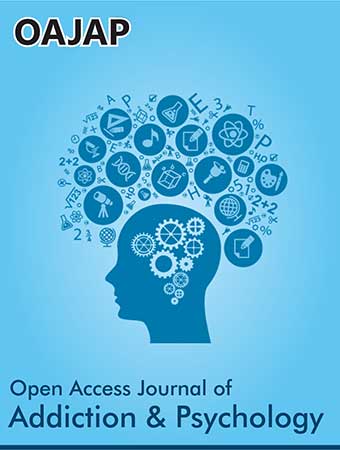 Opinion
Opinion
Need for Training in Clinical Programs on Recognition and Treatment of Substance Use Disorders
Natalie Montero*
Department of Social Work, Edinboro University of Pennsylvania, USA
Natalie Montero, Department of Social Work, Edinboro University of Pennsylvania, USA.
Received Date: August 16, 2021; Published Date: October 22, 2021
Abstract
All students in clinically oriented programs would benefit from SUD training that is infused in all courses across the curriculum along with courses specific to SUD. Introducing students to the basics of SUD in their early training would begin the process of their being cognizant of the possibility of any client/patient having SUD concerns. As the student moves through their course sequence they would be gradually exposed to increasingly more material on the complexity of SUD on the client/patient, the family, the workplace, and the community. Courses specific to SUD and EBT would further prepare students interested in focusing their clinical practice with those who have SUD. Preparing students in such a way would help to assure that they recognize and appropriately treat those suffering from SUD.
Opinion
Substance Use Disorder (SUD) is a major public health and medical concern. It can have devastating effects on the individual and to his/her family and friends. The National Center for Drug Abuse Statistics (2021) recently reported there were 700,000 deaths from drug overdoses in the United States since the year 2000 (https://www.addictioncenter.com/addiction/addictionstatistics/). In 2019 the National Survey on Drug Use and Health (NSDUH) reported that 20.4 million Americans 12 and older had an SUD with 71.1% of them using alcohol and about 40.7% using illicit drugs. The misuse of both alcohol and other drugs occurred in one of every five Americans and 9.5 million adults suffered from a combined mental health disorder and SUD (https:// americanaddictioncenters.org/rehab-guide/addiction-statistics). They stated that the cost of addiction was $740 billion from the loss of workplace productivity, healthcare costs, and costs related to crime. These are huge and tragic numbers.
The DSM-5 (2013) combined substance abuse and substance dependence into one disorder measured on a range from mild to severe when regular use of alcohol or other illicit drugs leads to clinically significant consequences (http://www.psychiatry.org). Understanding what SUD is and how to work with clients/patients suffering from SUD is imperative for students in the helping professions such as social workers, psychologists, nurses, and medical students, as SUD can be the primary focus of treatment or exacerbate other conditions.
Currently the NSDUH reports the rise in SUD due to COVID-19. This can be attributed to factors such as loss of a daily routine for many people, problems with poor mental health, interruption of treatment, and isolation. Worsening mental health conditions also contributes to self-harm and increased tolerance to alcohol or other drugs. Numerous mental health disorders are associated with SUD.
Other factors such as precipitating events, personality, the individual’s social environment, and medical diagnoses must also be taken into consideration. It is crucial for those in clinical education programs be adequately trained to understand the client’s/patient’s family, social, and employment environments and their connection to substance use. They must learn the etiology of SUD, as well as the evidence-based treatments (EBT) used to assist those with addictions.
Finally, all the helping professions have a Code of Ethics which guide them. The six ethical principles include autonomy (respect for the client’s rights and opinions), beneficence (concern for well-being and safety of clients), nonmaleficence (refrain from causing intentional harm to clients), justice, fidelity, and veracity form the base of professional ethical obligations (https://connect. springerpub.com). With these principles in mind, educators clearly need to prepare students for treating this population, and students must address these disorders in their training in order to be prepared to do so in their future professional practice.
All students in clinically oriented programs would benefit from SUD training that is infused in all courses across the curriculum along with courses specific to SUD. Introducing students to the basics of SUD in their early training would begin the process of their being cognizant of the possibility of any client/patient having SUD concerns. As the student moves through their course sequence they would be gradually exposed to increasingly more material on the complexity of SUD on the client/patient, the family, the workplace, and the community. Courses specific to SUD and EBT would further prepare students interested in focusing their clinical practice with those who have SUD. Preparing students in such a way would help to assure that they recognize and appropriately treat those suffering from SUD.
Acknowledgement
None.
Conflict of Interest
Author declare no conflict of interest.
-
Natalie Montero. Need for Training in Clinical Programs on Recognition and Treatment of Substance Use Disorders. 4(5):2021. OAJAP.MS.ID.000599. DOI: 10.33552/OAJAP.2021.04.000599.
Substance Use, Substance Use Disorders, Recognition, Treatment, Workplace, Drug Abuse Statistics, United States, Alcohol, Misuse, Mental health disorder, Substance dependence
-

This work is licensed under a Creative Commons Attribution-NonCommercial 4.0 International License.






